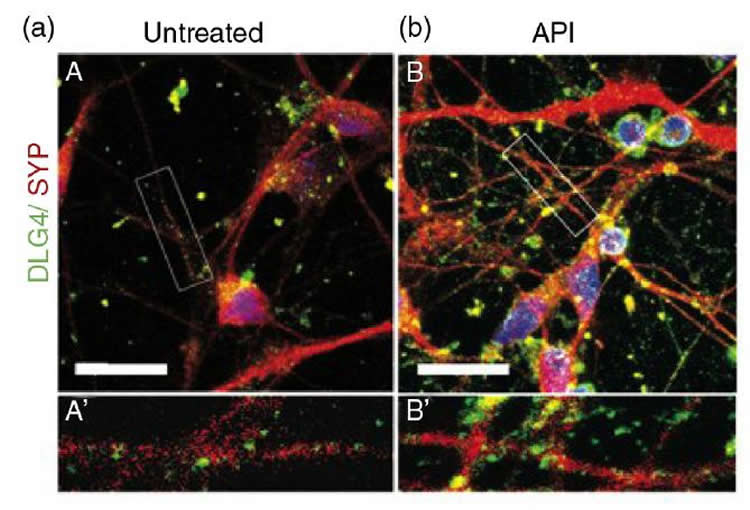Brazilian research shows that the flavonoid apigenin has potential to treat diseases like schizophrenia, depression, Alzheimer’s and Parkinson’s.
Brazilian researchers from D’Or Institute for Research and Education (IDOR), Federal University of Rio de Janeiro (UFRJ) and Federal University of Bahia (UFBA) have demonstrated in laboratory that apigenin, a substance found in parsley, thyme, chamomile and red pepper, improves neuron formation and strengthens the connections between brain cells.
Previous experiments with animals had already shown that substances from the same chemical group as the apigenin, known as flavonoids, positively affect memory and learning. Many studies highlight the potential of flavonoids to preserve and enhance brain function. While the effectiveness of flavonoids for brain health is not an entirely new concept, this research is the first to show the positive effects of apigegin directly on human cells and the first to unraveling its mechanism.
The scientists observed that just by applying apigenin to human stem cells in a dish they become neurons after 25 days – an effect they would not see without the substance. Moreover, the neurons that were formed made stronger and sophisticated connections among themselves after being treated with this natural compound.
“Strong connections between neurons are crucial for good brain function, memory consolidation and learning”, says neuroscientist from IDOR and UFRJ Stevens Rehen, leader author of the paper published today at Advances in Regenerative Biology.
The research team conducted by Rehen demonstrated that apigenin works by binding to estrogen receptors, which affect the development, maturation, function, and plasticity of the nervous system. This group of hormones is known to delay the onset of psychiatric and neurodegenerative disorders such as schizophrenia, depression, Alzheimer’s and Parkinson’s disease. However, the use of estrogen-based therapies is limited by the increased risk of estrogen-dependent tumors and cardiovascular problems.

Researchers believe apigenin can be used as an alternative approach on future treatments for neurodegenerative diseases as well as in neuronal differentiation strategies in laboratory.
“We show a new path for new studies with this substance”, points out Rehen. “Moreover, flavonoids are present at high amounts in some foods and we can speculate that a diet rich in flavonoids may influence the formation of neurons and the way they communicate within the brain.”
Funding: The study was part of the Phd dissertation of Cleide Souza, at the Program on Morphological Sciences of UFRJ and received financial support from the Brazilian agencies FAPERJ, CNPq, CAPES, BNDES and FINEP.
Source: Sofia Moutinho – D’Or Institute for Research and Education
Image Credit: The image is credited to Rehen et al.
Original Research: Full open access research for “Commitment of human pluripotent stem cells to a neural lineage is induced by the pro-estrogenic flavonoid apigenin” by Cleide S. Souza, Bruna S. Paulsen, Sylvie Devalle, Silvia Lima Costa, Helena L. Borges and Stevens K. Rehen in Advances in Regenerative Biology. Published online December 2015 doi:10.3402/arb.v2.29244
Abstract
Commitment of human pluripotent stem cells to a neural lineage is induced by the pro-estrogenic flavonoid apigenin
Flavonoids are polyphenolic compounds that are ubiquitous in plants and have biological effects on cancer cells and other cell types. In particular, apigenin (API) has been shown to bind to estrogen receptors, which affect the development, maturation, function, and plasticity of the nervous system. The aim of this study was to investigate the effects of 4′,5,7-trihydroxyflavone (API) upon the neural differentiation of human pluripotent stem cells. Treatment of both human embryonic stem cells and human induced pluripotent stem cells with API increased the number of nestin (NES+) neural progenitor cells compared to untreated controls. API also induced the expression of neuronal markers, such as β-tubulin-III (TUBB3), microtubule-associated protein 2 (MAP2), polysialylated-neural cell adhesion molecule (PSA-NCAM), synapsin 1 (SYN1), neurofilament (NEF), choline acetyltransferase (CHAT), glutamate decarboxylase (GAD1), and parvalbumin (PVALB) proteins. Antagonists of estrogen receptors (ESR1 and ESR2) suppressed the effects of API. API-induced differentiation was followed by increased expression of retinoic acid (RA) receptors (RARA and RARB) and retinoic X receptor (RXR) G, but not RARG1 or RXRB. Neural differentiation induced by API was drastically reduced by the inhibition of RARs. In addition, API also increased synaptogenesis in RA-differentiated neurons. These findings suggest that API induces neural differentiation of human pluripotent stem cells through estrogen receptor and RAR signaling and improves their functional differentiation into neurons.
“Commitment of human pluripotent stem cells to a neural lineage is induced by the pro-estrogenic flavonoid apigenin” by Cleide S. Souza, Bruna S. Paulsen, Sylvie Devalle, Silvia Lima Costa, Helena L. Borges and Stevens K. Rehen in Advances in Regenerative Biology. Published online December 2015 doi:10.3402/arb.v2.29244







